![]()
![]()
![]()
Use LEFT and RIGHT arrow keys to navigate between flashcards;
Use UP and DOWN arrow keys to flip the card;
H to show hint;
A reads text to speech;
80 Cards in this Set
- Front
- Back
|
What is a personality?
|
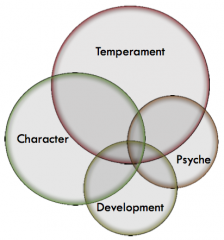
Relatively stable and enduring set of characteristic behavioral and emotional traits
|
|
|
What determines personality?
|
- Temperament: "nature"
- Character: "nurture" - Development: effect of "nurture" on biology - Psyche: self awareness (the ability to learn, adapt, change) |
|
|
Which determinant of personality, determines the "nature"?
|
Temperament
|
|
|
How important is temperament ("nature") for determining your personality? When is it apparent?
|
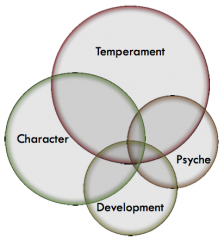
- 50% of personality is related to temperament
- Apparent before traditional learning occurs |
|
|
Which determinant of your personality is the effect of "nurture" on biology?
|
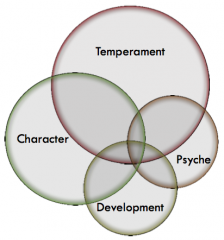
Development
|
|
|
How does Development affect your personality?
|
Negative events in early childhood (typically repeated, chronic abuse or neglect) can physiologically alter the limbic system and cause permanent effects on emotional arousal, etc
|
|
|
Which part of your personality is based on "nurture"?
|
Character
|
|
|
Which part of your personality is based on self awareness?
|
Psyche (the ability to learn, adapt, change)
|
|
|
What is the largest contributor to personality?
a) Temperament b) Psyche c) Character d) Development |
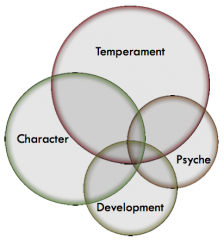
Temperament
|
|
|
What are defense mechanisms?
|
Unconscious mental processes that the ego uses to resolve conflicts between instinct (id), reality, important persons, conscience (supergo)
|
|
|
What is the contribution of the Id?
|
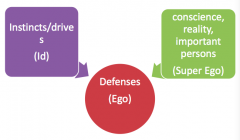
Instincts and Drives
|
|
|
What is the contribution of the Super Ego?
|
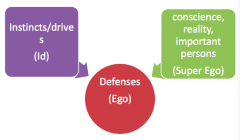
Conscience, reality, important persons
|
|
|
What is the contribution of the Ego?
|
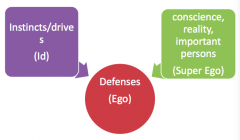
Defenses
|
|
|
What is the function of defense mechanisms?
|
Helps you to cope with difficult situations when your instinct is to do one thing (punch someone) and your mind/heart/conscience wants to do another (play nice)
|
|
|
When do defense mechanisms not work?
|
When they remain rigid, despite changing situations
|
|
|
How do defense mechanisms help?
|
When they are effective, they help resolve anxiety and depression
|
|
|
What are some types of defense mechanisms?
|
- Denial
- Dissociation - Suppression |
|
|
What happens in "denial"?
|
Ignoring reality (can be adaptive dealing with serious illness or can get in the way of treatment)
|
|
|
What happens in "dissociation"?
|
Mentally separating parts of one's consciousness from real life events
|
|
|
What happens in "suppression"?
|
Intentionally (consciously) pushing down to deal with now
|
|
|
What makes a personality disordered?
|
- Maladaptive
- Deeply ingrained / inflexible / stable - Often distressing / gets in the way of relationships or functioning Affects both the patient and significant others |
|
|
What does Ego-syntonic mean?
|
Acceptable to the ego - it doesn't bother them, it bothers others
Behaviors, values, feelings that are in harmony with or acceptable to the needs and goals of the ego, or consistent with one's ideal self-image. |
|
|
What does Ego-dystonic mean?
|
Uncomfortable
Opposite of egosyntonic and refers to thoughts and behaviors (e.g., dreams, impulses, compulsions, desires, etc.) that are in conflict, or dissonant, with the needs and goals of the ego, or, further, in conflict with a person's ideal self-image. |
|
|
Jenna is a 34 yo woman with who presents to your office for a well-woman visit and to establish care. She is very anxious about the possibility of getting sick while in your office because of “all of germs in here”. She wears a mask over her nose and mouth to protect herself from germs. She is not immunocompromised and does not have any medical issues. She lives alone and is not sexually active. When asked about the mask she says that she’s protecting herself and this “just makes sense” to do in a doctor’s office. Is this an example of an ego-syntonic or ego-dystonic thought?
a) Ego-syntonic b) Ego-dystonic c) What are you talking about? |
Ego-syntonic (it doesn't bother her, it bothers others)
|
|
|
What is the difference between OCPD and OCD in terms of ego-syntonic vs ego-dystonic?
|
- OCPD: ego-synotinc, perfection is expectation, not bothersome
- OCD: ego-dystonic, "I know it doesn't make sense, but..." |
|
|
What is the prevalence of personality disorders in:
- General population - Psychiatric outpatient populations - Inpatient psychiatric unit - Patients w/ Axis 1 disorders |
- General population: 10-18%
- Psychiatric outpatient populations: 30-50% - Inpatient psychiatric unit: >50% - Patients w/ Axis 1 disorders: 34% |
|
|
What is the prevalence of personality disorders in the general population?
a) 10-20% b) 34% c) 30-50% d) >50% |
10-20%
|
|
|
Personality Disorders are more common in women than in men.
a) True b) False |
False - personality disorders, in general, are equally common in men and women
Some personality disorders tend to be diagnosed more in one gender (borderline, histrionic for females, narcissistic, antisocial for males) - some validity, some stereotype |
|
|
What are the Cluster A Personality Disorders? Common characteristics?
|
More detached, eccentric personality disorders:
- Schizoid PD - Schizotypal PD - Paranoid PD |
|
|
Which personality disorder is associated with "emotionally detached, loners" that don't want relationships?
|
Schizoid Personality Disorder
|
|
|
What are the characteristics of Schizoid Personality Disorder?
|
- Emotionally detached, loners
- Don't want relationships |
|
|
How prevalent is Schizoid Personality Disorder? Males vs Females? Genetics?
|
Uncommon, up to 7.5% of general population
- Males diagnosed 2x as much as females - More common incidence of psychosis in relatives |
|
|
How does Schizoid Personality Disorder differ from Schizophrenia?
|
Schizoid Personality Disorder
- Absence of psychotic symptoms (hallucinations, delusions, though disorder) |
|
|
Which personality disorder is associated with "cognitive, perceptual, and behavioral eccentricities; frequently embrace beliefs such as telepathy, clairvoyance, and magical thinking, to a degree that exceeds cultural and subcultural norms"?
|
Schizotypal Personality Disorder
|
|
|
What are the characteristics of Schizotypal Personality Disorder?
|
- Cognitive, perceptual, and behavioral eccentricities
- Frequently embrace beliefs such as telepathy, clairvoyance, and magical thinking, to a degree that exceeds cultural and subcultural norms |
|
|
How prevalent is Schizotypal Personality Disorder? Genetics?
|
- 3% of population
- Highly genetic (33% concordance in monozygotic tiwns vs 4% in dizygotic) - Increased risk in biological relatives of schizophrenics |
|
|
Which personality disorder is associated with long-standing suspiciousness and mistrust of people (with no basis for this mistrust), reads threats into non-threatening situations, and pathologically jealous if in a relationship?
|
Paranoid Personality Disorder
|
|
|
What are the characteristics of Paranoid Personality Disorder?
|
- Long-standing suspiciousness and mistrust
of people (with no basis for this mistrust) - Read threats into non-threatening situations - Pathologically jealous if in a relationship |
|
|
How prevalent is Paranoid Personality Disorder? Males vs Females? Genetics?
|
- 0.5-2.5% of population
- Males diagnosed more than females |
|
|
Do patients with Paranoid Personality Disorder seek treatment?
|
Rarely seek treatment themselves, rare except for if they are motivated by somebody else or if it is interfering with their lives
|
|
|
How is Paranoid Personality Disorder distinct from schizophrenia?
|
- Absence of hallucinations or thought disorder
- Higher functioning - Non-bizarre paranoia |
|
|
What are the Cluster B Personality Disorders? Common characteristics?
|
More dramatic, impulsive
- Anti-social - Border-line - Histrionic - Narcissistic |
|
|
Which personality disorder is associated with frantic efforts to avoid real or imagined abandonment (interpersonal) or a pattern of unstable and intense interpersonal relationships characterized by alternating between extremes of idealization and devaluation?
|
Borderline Personality Disorder
|
|
|
What are the characteristics of Borderline Personality Disorder?
|
- Frantic efforts to avoid real or imagined abandonment (interpersonal)
- A pattern of unstable and intense interpersonal relationships characterized by alternating between extremes of idealization and devaluation (interpersonal, affective) - Affective instability due to marked reactivity of mood, “mood swings”, (can be argumentative one moment, depressed the next, and later complain of having no feelings) (affect) - Chronic feelings of emptiness - Recurrent suicidal behavior, threats or self mutilating behavior (impulse control) |
|
|
What does this patient likely have: getting distraught if a spouse is 5 minutes late getting home from work?
|
Borderline Personality Disorder
|
|
|
What does this patient likely have: placing dozens of phone calls to one’s therapist before the therapist goes on vacation?
|
Borderline Personality Disorder
|
|
|
What does this patient likely have: you are the best doctor ever after you prescribe Vicodin for minor knee pain. When you appropriately refuse to refill the prescription one month later you become the worst physician ever?
|
Borderline Personality Disorder
|
|
|
How prevalent is Borderline Personality Disorder? Males vs Females? Genetics?
|
- 1-2% of population
- Females diagnosed more commonly than males - High genetic load, more MDD and substance abuse in relatives |
|
|
How common is suicide in Borderline Personality Disorder?
|
Multiple suicide attempts, up to 10% complete suicide
|
|
|
Which personality disorder is associated with "repetitive unlawful acts and socially irresponsible behaviors that began prior to age 15; so unconcerned with the feelings and rights of others that they are morally bankrupt and lack a sense of remorse"?
|
Antisocial Personality Disorder
|
|
|
What are the characteristics of Antisocial Personality Disorder?
|
- Repetitive unlawful acts and socially irresponsible behaviors that began prior to age 15
- So unconcerned with the feelings and rights of others that they are morally bankrupt and lack a sense of remorse - Deceitful, impulsive - Irritability and aggressiveness - Reckless disregard for safety of self or others - Consistent irresponsibility (doesn’t honor financial obligations) - Lack of remorse |
|
|
How prevalent is Antisocial Personality Disorder? Males vs Females? Genetics?
|
- 3% of male population
- 1% of female population - High genetic load, 5x more common in relatives with the disorder |
|
|
Which personality disorder is aka sociopaths?
|
Antisocial Personality Disorder
|
|
|
Which personality disorder is associated with "pervasive overconcern with appearance and attention, exaggerated emotional response, poor frustration tolerance that ends in outbursts, and impressionistic speech that lacks detail. View physical attractiveness as the core of their existence."?
|
Histrionic Personality Disorder
|
|
|
What are the characteristics of Histrionic Personality Disorder?
|
- Pervasive overconcern with appearance and attention
- Exaggerated emotional response, poor frustration tolerance that ends in outbursts - Impressionistic speech that lacks detail - View physical attractiveness as the core of their existence |
|
|
How prevalent is Histrionic Personality Disorder? Males vs Females? Genetics?
|
- Believed to occur in 2-3% of population
- Females diagnosed more than males |
|
|
Which personality disorder is associated with a "heightened sense of self-importance, grandiose feelings and lack of empathy; preoccupied with fantasies of unlimited success, power, brilliance, beauty or ideal love; arrogant, entitled, and often envious; requires excessive admiration; takes advantage of others to achieve their own ends"?
|
Narcissistic Personality Disorder
|
|
|
What are the characteristics of Narcissistic Personality Disorder?
|
- Heightened sense of self- importance, grandiose feelings and lack of empathy
- Preoccupied with fantasies of unlimited success, power, brilliance, beauty or ideal love - Arrogant, entitled, and often envious - Require excessive admiration - Take advantage of others to achieve their own ends |
|
|
What are the Cluster C Personality Disorders? Common characteristics?
|
More anxious
- OCPD - Avoidant - Dependent |
|
|
Which personality disorder is associated with "becoming so preoccupied with details and rules that the major point of an activity is lost; display perfectionism that interferes with task completion and has inflexible values and overly conscientious"?
|
Obsessive Compulsive Personality Disorder
|
|
|
What are the characteristics of Obsessive Compulsive Personality Disorder?
|
- Become so preoccupied with details and rules that the major point of an activity is lost
- Display perfectionism that interferes with task completion (taking hours to do notes because it has to be perfect) - Have inflexible values and are overly conscientious |
|
|
How prevalent is Obsessive Compulsive Personality Disorder? Males vs Females? Genetics?
|
- M > F
- More common among first degree relatives w/ OCPD - Tend to be oldest children |
|
|
What are the defenses for a patient with Obsessive Compulsive Personality Disorder?
|
- Rationalizing
- Intellectualizing - Reaction formation - Undoing - Controlling |
|
|
How does Obsessive Compulsive Personality Disorder differ from OCD?
|
- Ego-dystonic (behaviors (e.g., dreams, impulses, compulsions, desires, etc.) that are in conflict, or dissonant, with the needs and goals of the ego, or, further, in conflict with a person's ideal self-image)
- Under stress, OCPD can develop OCD symptoms |
|
|
Which personality disorder is associated with "extreme sensitivity to rejection which may lead to a socially withdrawn life, although shy, they have a great desire for relationships"?
|
Avoidant Personality Disorder
|
|
|
What are the characteristics of Avoidant Personality Disorder?
|
- Show extreme sensitivity to rejection which may lead to a socially withdrawn life
- Although shy, they have a great desire for relationships (which differentiates them from schizoid p.d.) |
|
|
How does Avoidant Personality Disorder differ from Schizoid PD?
|
Avoidant PD patients are shy but have a great desire for relationships whereas Schizoid PD does not have a desire for relationships
|
|
|
Which personality disorder is associated with "subordinate of their own needs to those of others; lack self-confidence and can't make decisions without excessive advice and reassurance; doesn't speak up b/c may lose support or approval; uncomfortable being alone; urgently seeks another relationship when another ends"?
|
Dependent Personality Disorder
|
|
|
What are the characteristics of Dependent Personality Disorder?
|
- Subordinate their own needs to those of others
- Lack self-confidence and can’t make decisions without excessive advice and reassurance - Doesn’t speak up b/c may lose support or approval - Uncomfortable being alone - Urgently seeks another relationship when a close one ends |
|
|
How prevalent is Dependent Personality Disorder? Males vs Females? Genetics?
|
- Females diagnosed more than males
- Tend to be youngest children |
|
|
Personality Disorders cannot be treated.
a) True b) False |
False
|
|
|
What are the types of treatments for personality disorders?
|
- Psychodynamic psychotherapy – to change the defenses
- Behavioral (DBT) if self destructive behavior - Psychopharm – to target symptoms (Serotonin for impulse control, rejection sensitivity, mood stabilizer for lability, affect dysregulation) |
|
|
What is the purpose of psychodynamic psychotherapy for personality disorders?
|
To change the defenses
|
|
|
Which treatment strategy should be used for patients with self-destructive therapy?
|
Behavioral Therapy (DBT)
|
|
|
What can serotonin be used to improve in personality disorders?
|
- Impulse control
- Rejection sensitivity |
|
|
What can mood stabilizers be used to improve in personality disorders?
|
- Lability
- Affect dysregulation |
|
|
What considerations should a non-psychiatrist have for patients with personality disorders?
|
- Patients with personality disorders may bring out a lot of feelings in you (annoyance – dependent, feeling manipulated – borderline, “difficult patients”)
- Know this ahead of time and learn to recognize when you have these feelings - Understand their defenses - In the case of borderline p.d., they are not intentionally trying to manipulate you. This is the defense that worked for them at one point and it’s what they now know. - If you understand the origin of their behavior, you’ll be less frustrated |
|
|
What are the Cluster A Personality Disorders? Common characteristics?
|
More detached, eccentric personality disorders:
- Schizoid PD - Schizotypal PD - Paranoid PD |
|
|
What are the Cluster B Personality Disorders? Common characteristics?
|
More dramatic, impulsive
- Anti-social - Border-line - Histrionic - Narcissistic |
|
|
What are the Cluster C Personality Disorders? Common characteristics?
|
More anxious
- OCPD - Avoidant - Dependent |

